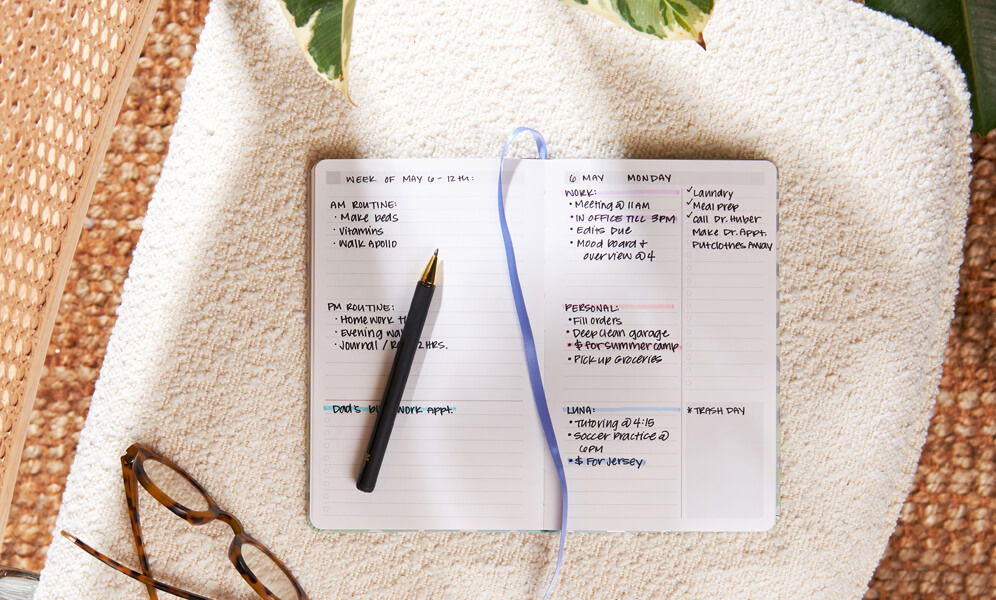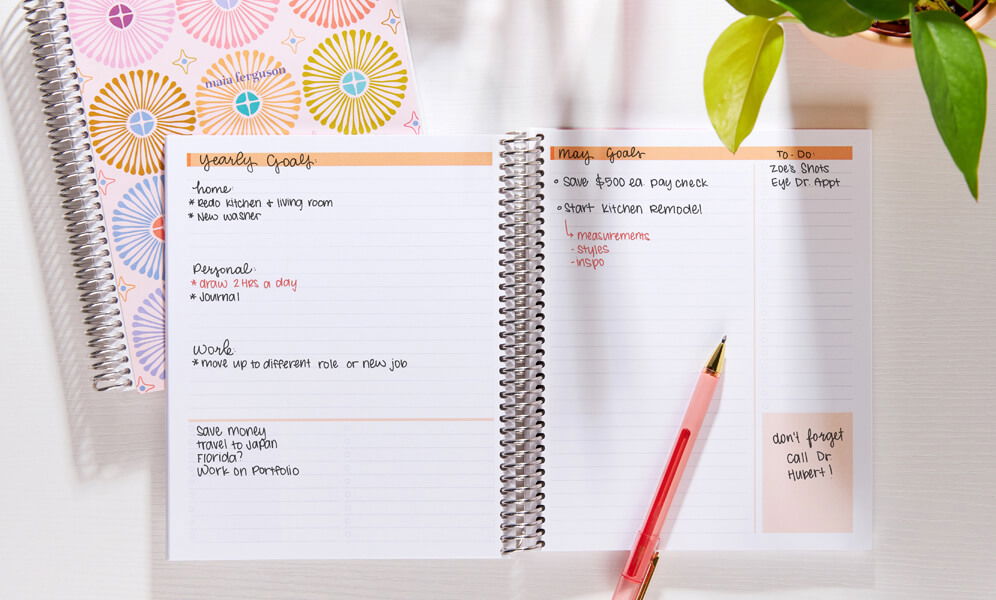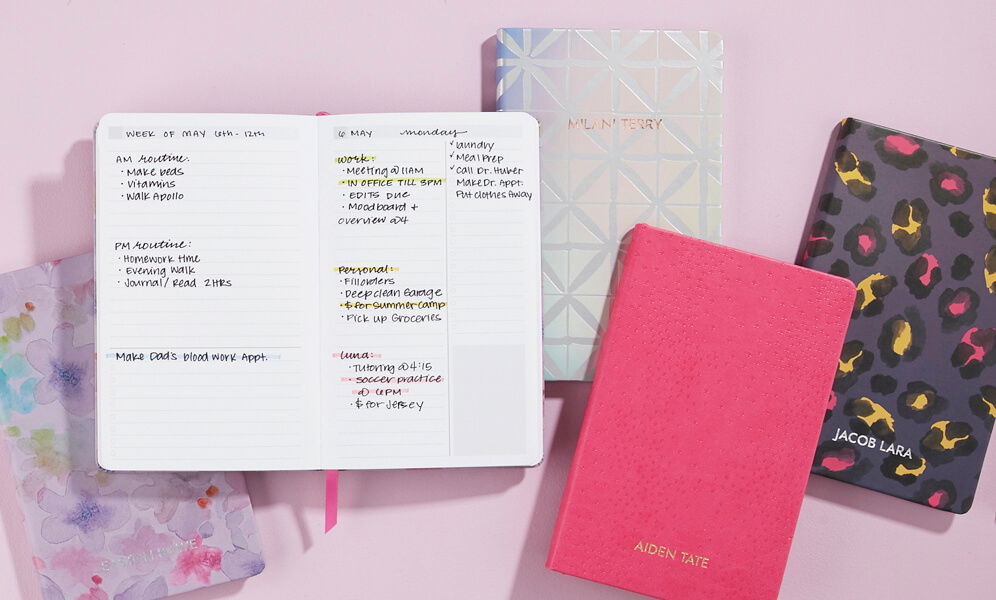8 Life-Changing Benefits of Journaling Before Bed + How to Start

A simple practice such as journaling before bed can lead to profound changes in your life. As organization experts who swear by the power of paper planners for stress management, time management, focus, and routine creation, we’ve gotten in bed with our journals and discovered the transformative benefits of bedtime journaling for ourselves. So, grab your journal, get cozy, and let’s explore the wonders of journaling before bed, uncovering eight life-changing benefits and offering practical tips on how to start this rewarding habit.
Is Journaling Before Bed Good for You?
In a word: yes! Journaling before bed can be incredibly beneficial for your overall well-being. This practice allows you to unwind, reflect on your day, and prepare for a restful night's sleep. It's a simple yet powerful way to prioritize self-care and mindfulness, setting the stage for a more fulfilling life.
8 Benefits of Journaling Before Bed
1. Stress Reduction and Relaxation
One of the most significant benefits of journaling before bed is its ability to reduce stress and promote relaxation. By putting pen to paper and expressing your thoughts and emotions, you release tension and clear your mind of worries and anxiety accumulated throughout the day. This process can soothe your nerves and prepare you for a peaceful night's sleep.
Lean more about The Benefits of a Stress Relief Journal + How to Start One.
2. Reduced Sleep Onset Latency
Sleep onset latency is a technical term for difficulty falling asleep. Sleep onset latency is a common problem among American adults craving a better night’s sleep. Research finds writing before bedtime, specifically to-do lists or journaling about what you want to accomplish the next day, significantly reduces sleep onset latency. Meaning, to-do list journaling before bed can help you fall asleep faster. Now, that’s one way to cross “get a better night’s sleep” off your to-do list!
3. Improved Sleep Quality
Speaking of better sleep, journaling before bed not only can reduce sleep onset latency but has been shown to improve sleep quality. By emptying your mind onto the pages of your journal, you free yourself from the mental clutter that often keeps you awake at night. This allows you to drift off more easily and enjoy a deeper, more restorative sleep.
Related: What Is a Sleep Diary? Plus, How to Fill It In
4. Enhanced Self-Awareness and Reflection
Journaling before bed provides a valuable opportunity for self-awareness and reflection. As you recount the tasks from your day and explore your thoughts and feelings, you gain insights into yourself and your life. This self-examination can lead to personal growth and a deeper understanding of what truly matters to you.
Read more about How to Start Mindfulness Journaling + Why You Should.
5. Organization and Goal Setting

As organization experts, we can't overstate the importance of journaling for staying organized and setting goals. By jotting down your tasks, to-do lists, priorities, and aspirations before bed, you not only reduce sleep onset latency, you also set yourself up for success the next day. This proactive approach to planning can help you stay focused, motivated, and on track to achieve your dreams (no pun intended).
Learn more about How to Set Weekly Goals + 23 Examples to Get You Started.
6. Creative Outlet and Expression
Journaling before bed is a creative outlet for self-expression. Whether you're writing prose, poetry, or simply jotting down your thoughts, this practice allows you to tap into your creativity and explore your imagination. It's a chance to unleash your inner artist and revel in the joy of creation before diving into a better night’s sleep.
Learn more about How to Start a Dream Journal and explore 30 Art Journal Prompts.
7. Gratitude and Positive Thinking
Practicing gratitude is a cornerstone of a happy and fulfilling life, and journaling before bed is the perfect opportunity to cultivate this mindset. By reflecting on the things you're grateful for each day, you shift your focus from what's lacking to what's abundant in your life. This shift in perspective can lead to greater happiness, resilience, and overall mental health.
Lean more about Journaling for Mental Health + Where to Start.
8. Memory Keeping and Retention
Research finds journaling before bed serves as a valuable tool for memory keeping and retention. By recording your experiences, thoughts, and emotions on paper, you create a tangible record of your life journey. This not only allows you to look back on past memories fondly but also helps you retain information and gain valuable insights from your experiences.
How to Start a Sleep Journaling Habit
Now that you're convinced of the benefits of sleep journaling before bed, let's explore how to start this transformative habit.
Choose a Journal That Inspires You.

The first thing on your to-do list to achieve better sleep should be selecting the right journal. It is a crucial step in establishing a fulfilling bedtime journaling habit. The sleep diary or sleep journal you choose should not only be practical and functional but also inspire you to engage with it regularly.
Here are some tips for finding a sleep diary or journal that speaks to you:
Consider Size and Format.
Think about the size and format of the sleep diary or sleep journal that best suits your needs and preferences. Whether you prefer a compact pocket-sized journal that you can easily carry with you or a larger notebook with plenty of space for writing and doodling, choose a size and format that feels comfortable and convenient for you.
Reflect on Aesthetics.
Pay attention to the aesthetic appeal of the journal, including its cover design, color scheme, and overall visual style. Select a sleep diary or sleep journal that resonates with your personal taste and reflects your unique personality and interests. Whether you're drawn to minimalist designs, vibrant patterns, or classic leather-bound journals, choose a journal that sparks joy and inspires creativity.
Consider Paper Quality.
The quality of the paper can significantly impact your sleep journaling experience. Look for journals with thick, smooth paper that can handle a variety of writing instruments without bleeding or smudging. Consider factors such as paper weight, texture, and opacity to ensure that your sleep journaling sessions are a pleasure rather than a frustration.
Explore Special Features.
Some journals come with special features that can enhance your journaling experience, such as built-in bookmarks, elastic closures, or expandable pockets. Explore different options and consider whether these features would be useful or desirable for your needs. While these features aren't essential, they can add convenience and functionality to your journaling routine.
Personalize Your Journal.
Consider personalizing your journal to make it truly your own. Whether you add your name to the cover, decorate the pages with stickers and washi tape, or include a handwritten dedication on the first page, infuse your journal with elements that reflect your identity and creativity. Personalizing your journal can make it feel more special and meaningful to you.
Try Before You Buy.
If possible, spend some time browsing journals in person to get a feel for their quality and aesthetics. Flip through the pages, test out different writing instruments, and envision yourself using the journal daily. If you're purchasing online, read reviews and look at photos to get a sense of the journal's appearance and features.
Set a Consistent Routine.
Consistency is key when it comes to establishing any new habit and journaling before bed is no exception. Set aside a few minutes for this task each night and sit down with your journal to reflect on your day. To set a consistent routine for your bedtime journaling practice, consider the following tips:
Choose a Specific Time.
Select a specific time each night for this task and sit down with your journal. Whether it's right before you brush your teeth, after you've changed into your pajamas, or before you crawl into bed, pick a time that works best for you and stick to it.
Create a Ritual.
Incorporate journaling into your bedtime routine by pairing it with other relaxing activities. For example, you could brew a cup of herbal tea, dim the lights, and light a scented candle before you begin journaling. Creating a calming ritual can help signal to your body that it's time to unwind and prepare for sleep.
Eliminate Distractions.
Minimize distractions during your journaling time by finding a quiet, comfortable space where you can focus without interruption. Turn off your phone and silence notifications, tune out negative thoughts, and create a peaceful environment conducive to reflection and introspection.
Set a Timer.
If you're prone to getting lost in your thoughts or spending too much time journaling, consider setting a timer to keep yourself on track. Allocate a specific amount of time for journaling each night, whether it's five minutes or half an hour, and commit to sticking to it.
Be Flexible.
While consistency is important, it's also essential to be flexible and adaptable with your routine. Life can be unpredictable, and there will inevitably be nights when you're too tired or busy to journal before bed. In those instances, don't be too hard on yourself. Instead, aim to get back on track the following night and continue building your journaling habit over time.
Start Small
If you're new to journaling, feel free to write pages upon pages each night. Start small by jotting down a few bullet points, to-do lists, or sentences about your day, and gradually increase the length as you become more comfortable with the practice.
Here are some practical tips for starting small with your bedtime journaling practice:
Set Realistic Expectations.
Recognize that you don't need to write pages upon pages in your journal every night. Instead, aim for a manageable goal, such as jotting down a few sentences, to-do lists, or bullet points about your day. Keep in mind that consistency is more important than quantity when it comes to journaling.
Commit to a Minimum Time.
Rather than focusing on the length of your journal entries, commit to spending a minimum amount of time each night dedicated to journaling. Start with just five minutes and gradually increase the duration as you become more comfortable with the practice. Even a brief nightly reflection can have significant benefits over time.
Focus on Quality Over Quantity.
When starting small, prioritize quality over quantity in your journaling efforts. Instead of trying to cover every detail of your day, focus on capturing the most significant moments, thoughts, and emotions. Keep in mind that quality journaling allows for deeper reflection and introspection, even in short bursts of time.
Choose Simple Journaling Prompts.
If you're struggling to come up with what to write, consider using simple journaling prompts to kickstart your creativity. Prompts can provide structure and guidance for your reflections, making it easier to get started. Some examples of simple journaling prompts can include "What was the highlight of my day?" or "What am I grateful for today?" or “What to-dos do I want to tackle tomorrow?”
Celebrate Small Wins.
Celebrate your progress and small victories along the way. Whether you've successfully journaled for five consecutive nights or written your first page in your new journal, take a moment to acknowledge your achievements and pat yourself on the back. Positive reinforcement can help motivate you to continue building your journaling habit over time.
Use Journaling Prompts

Utilizing prompts can be a game-changer for your bedtime journaling practice, especially if you're new to journaling or find yourself at a loss for what to write about. Journaling prompts provide a starting point and can help stimulate your creativity, leading to deeper reflection and more meaningful journal entries.
Here's how you can make the most of prompts:
Find Inspiration.
Look for journaling prompts that resonate with you and align with your interests, values, and goals. You can find prompts in books, online resources, or even create your own based on specific themes or areas of focus. Whether you're interested in gratitude, self-discovery, or goal-setting, there are prompts out there to suit your needs.
Mix It Up.
Variety is the spice of life, and the same holds true for journaling prompts. Experiment with different types of prompts to keep your journaling practice fresh and engaging. Mix it up by alternating between reflective prompts that encourage introspection, creative prompts that inspire imagination, and practical prompts that focus on goal-setting and planning.
Tailor Journaling Prompts to Your Needs.
Don't be afraid to tailor prompts to suit your specific needs and preferences. If a prompt doesn't resonate with you or feels too generic, tweak it to make it more relevant and meaningful. Personalizing prompts allow you to make your journaling practice truly your own and ensure that you derive maximum benefit from it.
Use Open-Ended Questions.
Opt for open-ended prompts that encourage exploration and self-expression. Instead of asking yes/no questions or prompts with definitive answers, choose prompts that invite you to delve deeper into your thoughts, feelings, and experiences. Open-ended questions foster creativity and encourage you to explore new perspectives and insights.
Be Honest and Authentic.
When responding to prompts in your journal, be honest and authentic in your reflections. Don't censor yourself or worry about writing perfectly. Remember that your journal is a safe space for self-expression, free from judgment or criticism. Embrace vulnerability and allow yourself to be genuine in your writing.
Reflect and Revisit.
After journaling with prompts, take time to reflect on your responses and revisit them periodically. Reviewing your past entries can provide valuable insights into your growth, progress, and areas for improvement. Reflecting on your journey through journaling prompts allows you to gain clarity, perspective, and self-awareness over time.

Journaling before bed offers a multitude of benefits for your physical, mental, and emotional well-being. From stress reduction and improved sleep quality to enhanced self-awareness and creativity, this simple practice has the power to transform your life in profound ways. So why not give it a try? Grab a journal, find a cozy spot, and start reaping the rewards of bedtime journaling (starting with a better night’s sleep) tonight. Your future self will thank you!
Related Journaling Guides
You may also enjoy these other popular, guided journaling tips, prompts, and inspiration from our experts:
- How to Start Mindfulness Journaling + Why You Should
- Journaling for Mental Health + Where to Start
- The Benefits of a Stress Relief Journal + How to Start One
- Wellness Journal Ideas
- Exploring Faith Through Journaling
- How to Use a Planner to Reduce Stress
- 20 Cute Things to Do with a Blank Notebook
- Guided Journals: Everything You Need to Know
- How to Start a Gratitude Journal and Unlock the Power of Positivity
- 8 Life-Changing Benefits of Journaling Before Bed + How to Start
- Journaling for Anxiety: How to Start
- How to Do a Daily Gratitude Challenge + Why You Should
- How to Use a Line a Week Journal: A Comprehensive Guide + Prompts
- 10 Creative Weight Loss Journal Ideas